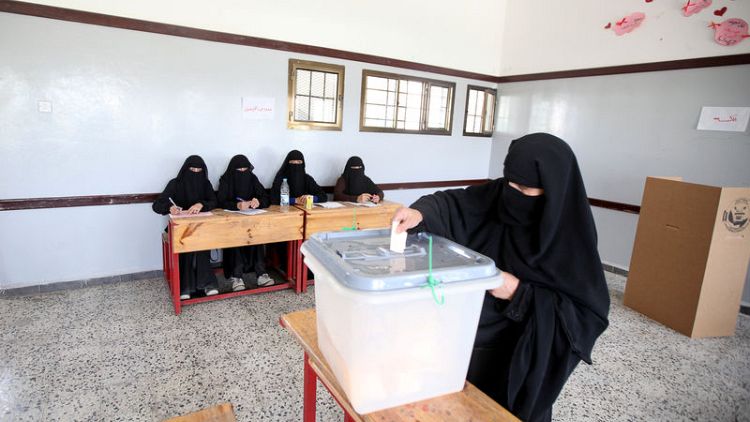ADEN (Reuters) - Yemeni President Abd-Rabbu Mansour Hadi, who lives in Saudi Arabia while rival Houthi forces control the capital Sanaa, made a rare visit to his country on Saturday for a meeting of the divided parliament in a loyalist southern province.
In Sanaa, however, the Houthis have started to organise elections to fill 24 vacant seats in the same parliament, state news agency SABA said.
Both sides are under pressure from international players to implement a United Nations-sponsored ceasefire deal agreed last year in Sweden and to prepare for a wider political dialogue that would end the four-year-old war. Lawmakers from both sides would ultimately meet to agree on a political framework.
Hadi's Riyadh-backed government, which is still recognised internationally, has been based in the southern port city of Aden since 2015 and Hadi has not set foot there since a visit last August.
Hadi-aligned parliamentarians gathered in Sayun, Hadramout province on Saturday elected Sultan al-Burkani of the General People's Congress (GPC) of late Yemeni President Ali Abdullah Saleh as their new speaker.
The Saudi-led military coalition fighting the Houthis in the devastating war has been trying to recruit GPC members and fighters since Saleh was killed in December 2017 after switching sides away from the Houthis.
"This extraordinary session is held in a historic moment as we stand in a crossroad between choices of war and peace," Hadi told the 145 parliamentarins meeting in Sayun.
"We support the U.N. special envoy to achieve a comprehensive peace," he said.
In Sanaa, Houthi Prime Minister Abdelaziz Bin Habtour put forward plans for an election under Houthi auspices for the same parliament.
"Voters will elect who will represent them constitutionally and legally," he said, quoted by SABA.
Last December in Stockholm, the two sides agreed on a ceasefire and troop withdrawal in Hodeidah port, an exchange of prisoners, and the reopening of humanitarian corridors to help millions of starving Yemenis, with international monitors to oversee events.
The pact is intended to clear the way for wider political negotiations, with a transitional government supported by both sides, to end the war.
The Saudi-led coalition has accused the Iran-aligned Houthis of breaching the agreement. The Houthis want more guarantees from the United Nations that the other side will not exploit their withdrawal.
The ceasefire in Hodeidah has largely held despite an increase in violence in other parts of the country not subject to the agreement.
The Saudi-led coalition intervened in Yemen's civil war in 2015 to restore Hadi's government, but the war has reached a military stalemate.
Tens of thousands of people, mostly civilians, have been killed and an economic collapse has left about 16 million facing severe hunger.
(Reporting By Mohamed Ghobari, additional reporting and writing by Aziz El Yaakoubi, Editing by Angus MacSwan)
